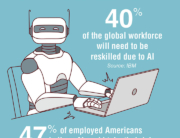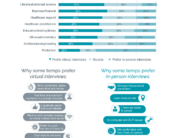Generative AI is more likely to augment jobs than eliminate them, according to a report released Aug. 21 by the International Labour Organization.
The research found only a small share of tasks in occupational groups such as managers, professionals and technicians are highly exposed to the automating effects of AI on jobs, while about a quarter have medium exposure levels. On the other hand, clerical work has the highest exposure level.
Also, in high-income countries, 5.5% of total employment is exposed to the automating effect of generative AI; however, the report found only 0.4% of jobs are exposed in low-income countries. On the other hand, the potential for augmentation by AI is nearly equal across countries.
Women’s jobs will also be more impacted, with twice the share of female employment exposed to generative AI. This is because women are overrepresented in clerical work, especially in high and middle-income countries. The report also noted clerical jobs have traditionally been an important source of female employment as countries develop economically, and one result of generative AI could be that certain clerical jobs may never emerge in lower-income countries.
The report cautioned that proper regulatory policies must be put in place or there is a risk that only some of the well-positioned countries and market participants will be able to benefit from the transition to increased AI.
“Ultimately, we argue that in the realm of work, generative AI is neither inherently good nor bad and that its socioeconomic impacts will largely depend on how its diffusion is managed,” the report states. “The questions of power balance, voice of the workers affected by labor market adjustments, respect for existing norms and rights, and adequate use of national social protection and skills training systems will be crucial elements for managing AI’s deployment in the workplace.”
41% of US workers say AI will have a ‘positive impact’: Robert Half
 Belying a widespread impression that generative artificial intelligence will erase jobs, some workers have taken a positive attitude toward it. According to a survey by professional staffing firm Robert Half Inc., 41% of US workers believe generative AI will have a “positive impact” on their careers. Optimism is not unconditional, however, as 14% worry it could make their skills obsolete.
Belying a widespread impression that generative artificial intelligence will erase jobs, some workers have taken a positive attitude toward it. According to a survey by professional staffing firm Robert Half Inc., 41% of US workers believe generative AI will have a “positive impact” on their careers. Optimism is not unconditional, however, as 14% worry it could make their skills obsolete.
Occupation strongly influences workers’ attitudes about AI. About 63% of technology professionals and 54% of HR professionals said generative AI will create more demand for their skills, according to the survey. Generational differences also influence workers’ outlook. The survey found 63% of Gen Z and 57% of millennials said they’re more optimistic about the benefits of AI, while only 30% of Gen X and 21% of baby boomers were.
“Given the hype around generative AI, it’s natural for workers to question the impact it will have on their immediate and long-term job prospects,” Trisha Plovie, senior VP of future of work at Robert Half, said in a press release. “What’s important right now is for both workers and employers to prioritize and understand the capabilities, benefits and risks it may present.”
The greatest benefits of generative AI cited by workers were automating time-consuming tasks, 35%, and increasing efficiency and productivity, 30%.
While 14% of workers said they believe generative AI could make their skills obsolete, 26% believe generative AI will have little to no impact on their career, according to the report, which surveyed more than 2,500 workers in the US.
53% of digital nomads staying in US
 More than half of American digital nomads, 53%, now plan to embrace their work-travel lifestyle exclusively within the US, according to a report released in August by MBO Partners. Only 10% of all digital nomads intend to spend the entire year abroad, while 47% plan on spending at least some time in another country.
More than half of American digital nomads, 53%, now plan to embrace their work-travel lifestyle exclusively within the US, according to a report released in August by MBO Partners. Only 10% of all digital nomads intend to spend the entire year abroad, while 47% plan on spending at least some time in another country.
Digital nomads are people who earn a living online while working from different locations rather than a fixed office. The organization found that 17.3 million American workers currently describe themselves as digital nomads, increasing 2% from 2022.
The report also found that about one-third of digital nomads with traditional jobs are “hidden nomads” whose employers do not know they are nomadic. While 14% of those with traditional jobs said their employer does not know they are nomadic, 18% said their company has no digital nomad policy, but their boss has permitted them to work nomadically.
Meanwhile, more countries and cities are vying to have digital nomads; 58 countries have created special digital nomad visas and other programs, according to the report.







